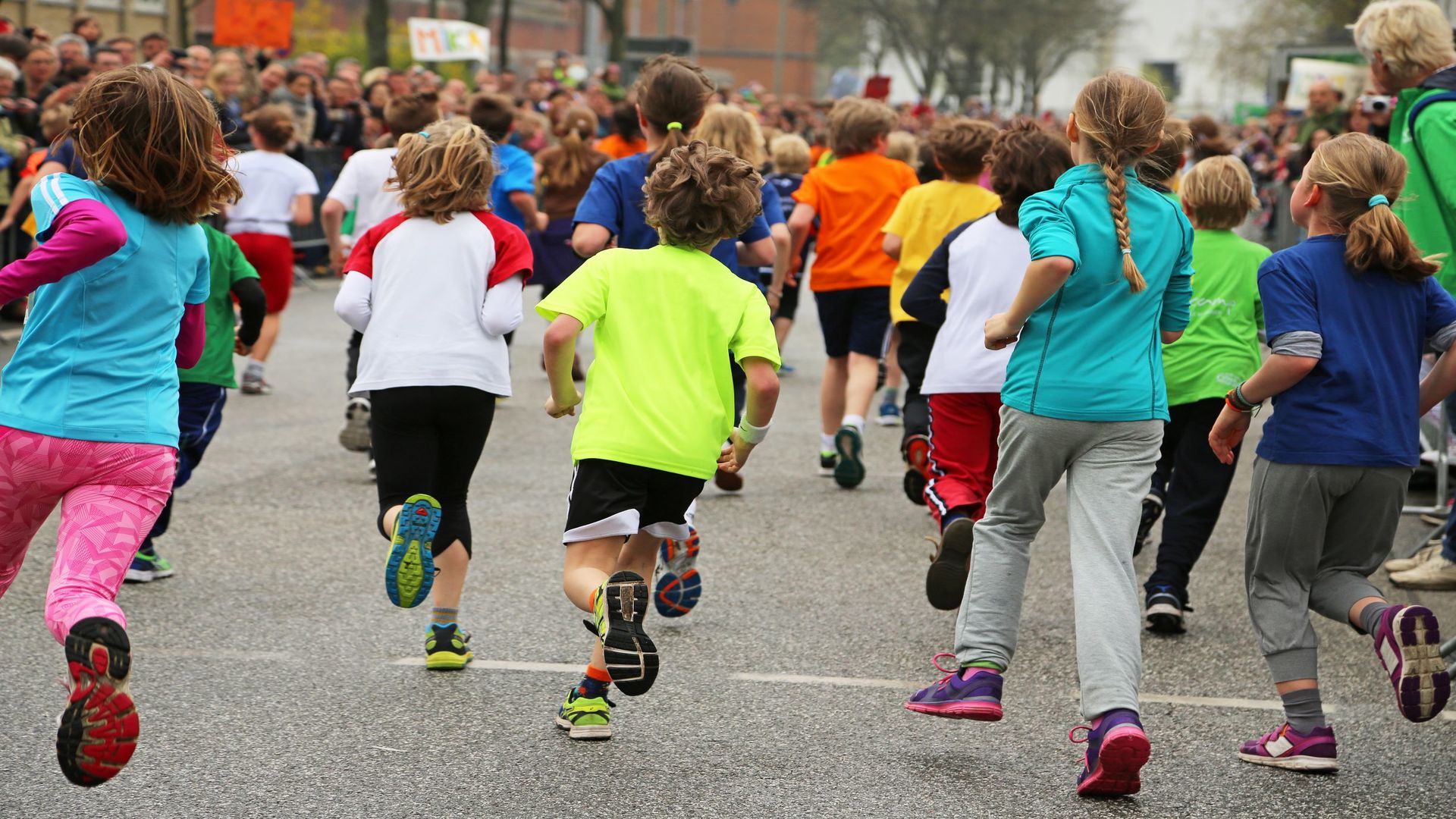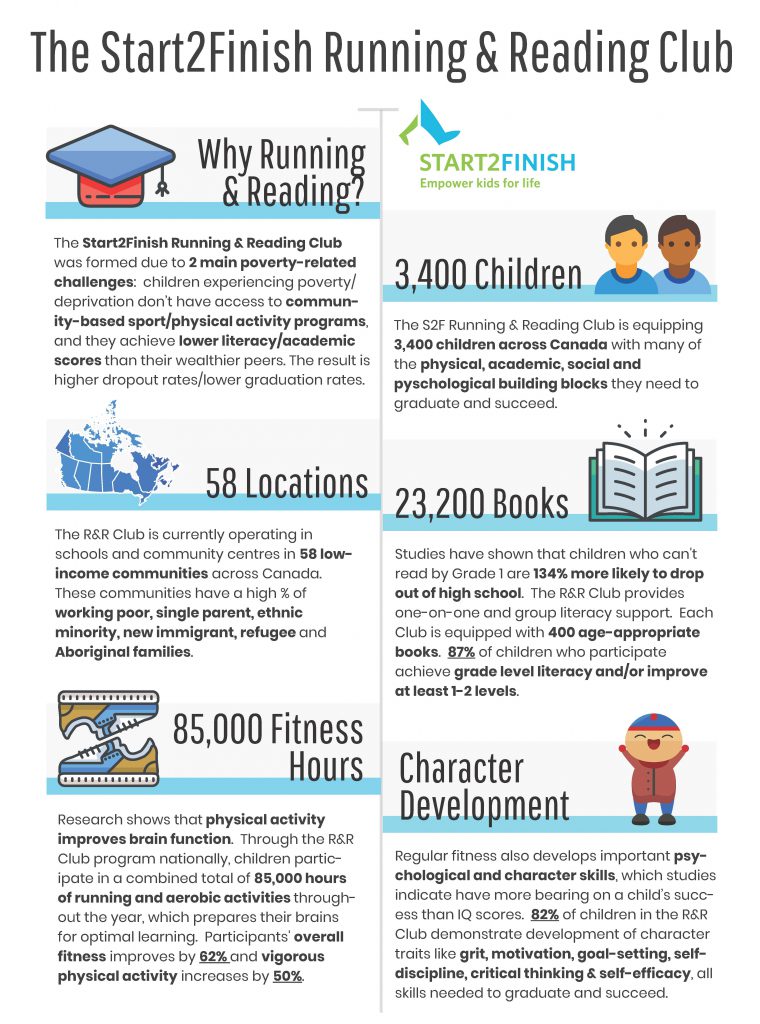Share This
Related Posts
Tags
Neuroscience in the Park
By Erica Rascón on Jan 15, 2020 in Giving
The importance of childhood play has had anecdotal value for ages. In the 1960s, however, studies on rodents and brain development encouraged neuroscientists to formally explore the importance of play in childhood development. Their efforts have paved the way for programs like Start2Finish that improve childhood academic performance through physical activity.
Acknowledging multi-dimensional complexity
When it comes to academic success, literacy takes center stage. The ability to read improves academic performance in mathematics and other areas of study. But the benefits of education do not stop in the classroom. Multiple studies note the correlation between a nation’s literacy skills and the well-being of its inhabitants.
Improving literacy depends on consistent exposure to literature. For Canada’s 1 million children living in poverty, exposure is inconsistent at best: limited access to libraries, few books at home, and single-parent households with tight resources are just a few contributing factors to childhood illiteracy.
In public schools, governments fail to adequately and equally equip all school with resources. Teachers spend $143 million of their own money to buy reading materials for their students yet the gap remains. As a result, children living in poverty are about 4.5 times behind their peers in vocabulary development. The lack of literacy development then creates a snowball effect in other areas of study.
A sedentary lifestyle adds to the complexity of children’s developmental hurdles. Children in low-income homes are twice as likely as children from middle class homes to live in a neighborhood where violence and drug-trafficking are everyday occurrences. Impoverished areas also have fewer parks. Neighborhood dangers and a lack of access to green spaces minimize youths’ exposure to natural environments and safe places to play.
Low literacy and physical activity contribute to an under-stimulated hippocampus in children’s brains. Executive function, learning, and concentration are all adversely affected.
Overcoming invisibility to promote change
When playing for the Canadian Football League, Brian Warren would often participate in meet-and-greets with kids from area of complexity. The kids would watch a game, hear a few words of inspiration, receive an autographed ball, and then return home. Mr. Warren felt like it was not enough.
He soon founded Start2Finish, a nonprofit organization that uses neuroscience techniques favored by athletic and business professionals to help children excel in school. Karen Pessoa-Warren, director of operations, explains the inspiration behind the organization.
“Athletes get exclusive  training in the connection between mind and body. Why couldn’t this work with the kid struggling in school and at home?” proposes Pessoa-Warren. “We find the kids are most vulnerable in the areas of executive control and focus, things athletes are trained in. We’ve married these very unlikely concepts, to stimulate the hippocampus with books and physical activity. A snowball effect then happens. Not only are they reading better, which even helps with math, but they’re better able to multi-task, stay focused, and manipulate thought.”
training in the connection between mind and body. Why couldn’t this work with the kid struggling in school and at home?” proposes Pessoa-Warren. “We find the kids are most vulnerable in the areas of executive control and focus, things athletes are trained in. We’ve married these very unlikely concepts, to stimulate the hippocampus with books and physical activity. A snowball effect then happens. Not only are they reading better, which even helps with math, but they’re better able to multi-task, stay focused, and manipulate thought.”
Though the research was in place, it would take a change of perspective for the organization to succeed throughout the country. The Warrens first endeavoured to shine light on local childhood poverty, a topic that went largely unrecognized.
“In Canada, people don’t think we have childhood poverty,” reflects Pessoa-Warren. “We don’t have an index for poverty, but one out of five kids live at or below the poverty line. We needed to let people know that poverty exists.”
Secondly, they found themselves battling the notion that poverty and poor academic performance were character flaws rather than systemic problems. She adds, “We have a strong social net here, but kids still fall through. Without understanding of the data or the complexity surrounding their lives, people thought those who struggled in school weren’t bright or that it was a family issue.”
Public education continues to be a part of the work at Start2Finish.
Read, play, excel
Children living in areas of complexity are facing an uphill battle. The team at Start2Finish has developed a creative plan to give kids the tools needed to succeed. The organization offers the five-step program “Pathway of Hope” program that helps kids close the achievement gap on literacy and wellness.
Through the Pathway of Hope, students are empowered with:
- schools supplies in the beginning of each year
- a supportive environment in the 32-week running and reading clubs. On average, participants experience an improvement of one to two letter grades and a 50% increase in vigorous physical activity
- a coaching program that transforms program graduates into junior coaches for rising participants
- scholarship opportunities for education at a Canadian post-secondary institution
- community involvement and outreach by program graduates
Decades of analysis on graduate performance demonstrate the strength of the program. Participants experience a significant decrease in hyperactivity problems and conduct problems, increased levels of intrinsic motivation, high self-efficacy in physical activity and sports, improved peer relationship, and greater perceptions of mastery four major areas.
The format has been so successful that the organization is now in 50 communities throughout Canada. The recent addition of 12 new clubs was made possible in part by a donation from Yardi.
“We’re so happy for Yardi’s donation,” says Warren. “We are expanding in Ontario. Yardi has supported 12 new clubs in the region and we’re getting kids off waiting list. Without the expansion, kids would have to wait about two years to enroll.”
Supporting Start2Finish
In 2020, Start2Finish celebrates its 20th year. More than 15,000 students have successfully graduated the program. There are several 20th anniversary events scheduled for the year, each detailed on the Start2Finish Facebook page.
Guests are invited to the Fuel for Success event on February 13, 2020. The meal brings together program graduate, students, business owners, and community leadership to discuss the latest in program developments and the future of the organization.
Learn more about Yardi’s corporate social responsibility on our Giving page.

